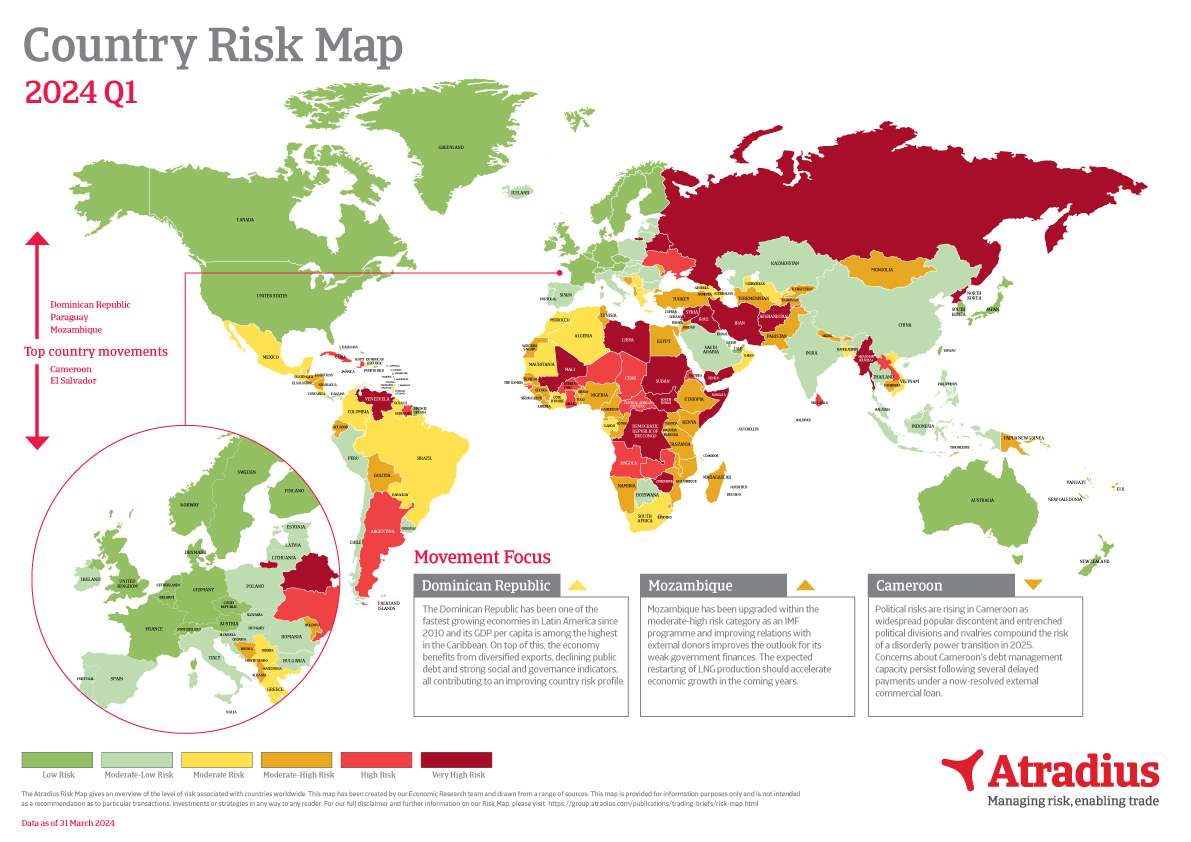The Risk Map gives an overview of the level of risk associated with countries worldwide. Risk ratings are based on a variety of political and economic factors gathered by our Economic Research Team.
The Atradius Risk Map is drawn from a range of sources and features the STAR rating system. This is a system devised by the Atradius Economic Research Team for assessing country risk, including different political and economic risks, or civil unrest and conflict.
Quarter 1 2024 political and economic risk focus
Dominican Republic
The Dominican Republic has been one of the fastest growing economies in Latin America since 2010 and its GDP per capita is among the highest in the Caribbean. On top of this, the economy benefits from diversified exports, declining public debt and strong social and governance indicators, all contributing to an improving country risk profile.
Mozambique
Mozambique has been upgraded within the moderate-high risk category as an IMF programme and improving relations with external donors improves the outlook for its weak government finances. The expected restarting of LNG production should accelerate economic growth in the coming years.
Cameroon
Political risks are rising in Cameroon as widespread popular discontent and entrenched political divisions and rivalries compound the risk of a disorderly power transition in 2025. Concerns about Cameroon’s debt management capacity persist following several delayed payments under a now-resolved external commercial loan.

Political and Economic Country risk
Companies that do business internationally rely on the stability of the business environment in the foreign country. Profits and investments can be vulnerable to adverse developments in this environment. These risks are broadly termed ‘country risk’. The level and change in country risk is, therefore, an important strategic and operational indicator for international companies.
Country risk covers a wide range of factors such as political developments, the risk of (armed) conflict and sovereign financial situation. These factors relate, for example, to regulatory changes, the risk of confiscation, civil unrest, war, currency controls and devaluations. Country risk takes into account a sovereign’s willingness and ability to pay and the impact of this on the ability of public or private entities to meet their cross-border payment obligations. Under our political risk cover contract, we provide cover against a subset of ‘country risk’ events. If you would like to learn more information about an individual market and their STAR rating, see our Country Reports.
The Atradius STAR rating
STAR is the Atradius in-house political risk rating. STAR stands for Sovereign Transfer and Arbitrary Risk and represents a rating system for assessing country risk. The STAR rating is a summary measure of political risk relevant to the Atradius insurance contract and explicitly targets the impact on public or private entities with cross-border payment obligations.
Broadly speaking, the default triggers under an Atradius Political Risk Policy are classed as either Sovereign Transfer or Arbitrary Risk.
The STAR rating runs on a scale from 1 to 10, where 1 represents the lowest risk and 10 the highest risk. The 10 rating steps are aggregated into five broad categories to allow their interpretation in terms of credit quality. Starting from the most benign part of the quality spectrum, these categories range from ‘Low Risk’ to ‘Very High Risk’.
All content on this page is subject to our Disclaimer, available here.

